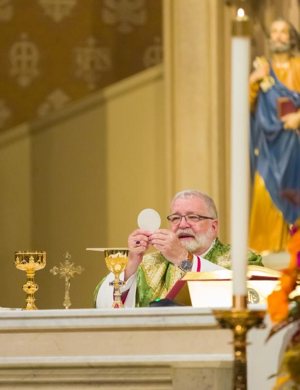
Acknowledging evidence that “for several generations” the Catholic Church has not sufficiently taught its core truths, Bishop Daniel R. Jenky has called for all ministries of the Diocese of Peoria to be “intentionally centered” on the Real Presence in the holy Eucharist.
The bishop’s 2,100-word teaching document, titled “The Real Presence,” was released Sept. 16, six weeks after the publication of a Pew Research Center survey showing that a majority of Catholics in the United States do not believe that the bread and wine used at Mass become the body and blood of Christ.
“This failure in faith and conviction has happened despite the fact that the received teaching goes back to apostolic times and has always been held as foundational to our Catholic identity,” wrote Bishop Jenky. “So as your bishop, I believe it is a grave personal obligation for me to try to state as clearly as I am able some basic truths about the Blessed Sacrament.”
Bishop Jenky outlined “persistent evidence” of the Real Presence found in Scripture, the Catechism of the Catholic Church and the witness of the saints.
“It is a defined dogma of the Catholic Church, revealed by the Holy Spirit and preserved from any possibility of error, that the body and blood, soul and divinity of Jesus Christ are truly and substantially present in the most holy Eucharist,” he wrote. “This is not an opinion to be measured against any opinion poll, but rather divine revelation as expressed by the absolute authority of Scripture and tradition.”
Bishop Jenky also had strong words for Catholics who would deny the teaching.
“The Lord once said: ‘Whoever eats my flesh and drinks my blood shall live forever, and I will raise him up on the last day,'” he said, quoting the Gospel of St. John. “So for any Catholic to deny the Real Presence is in a certain sense to deny Jesus and place themselves outside of the convictions of our faith.”
Since his installation as bishop of Peoria in 2002, Bishop Jenky has issued an annual teaching document called a “Festival Letter,” usually near the start of the calendar year. In an introductory letter to “The Real Presence,” the bishop said his 2020 Festival Letter was being released early to set the tone for the diocese’s various ministries as programs resume this fall.
The full text will be printed in the Sept. 29 issue of The Catholic Post, Peoria’s diocesan newspaper, and a downloadable version will be posted at cdop.org/bishop-jenky/festival-letters.
“While every doctrine of our faith is important, faith in the Eucharist is clearly foundational for Catholic Christianity,” Bishop Jenky wrote in the introductory letter. “I therefore ask that this year and in coming years … our entire local church look for ways to reinforce our teaching and witness regarding the Blessed Sacrament.”
In the main document, Bishop Jenky said Catholics share “a perennial responsibility before Almighty God” to pass on divine truth “in season and out of season, uncompromised and undiminished.”
And while the church’s teaching on the Real Presence hasn’t changed, Bishop Jenky pointed to a “noticeable decline in our ritual reverence and recognition” in recent decades.
“How we pray is certainly integral to how we believe,” he wrote. Attentive silence in church — as well as rituals including genuflecting, blessing with holy water, and prayers before and after Mass — “encouraged a kind of shared awe before something experienced as numinous and wondrous.”
But contemporary American culture tends to be “relentlessly informal,” said the bishop, and “sometimes our churches may seem more like hotel lobbies than an awesome House of God.”
In addition to regular instruction, Bishop Jenky listed several ways that reverence for the Real Presence can be enhanced, including eucharistic devotions such as Holy Hours, Benediction, processions and quiet times of personal prayer.
He said Masses at weddings and funerals provide “great opportunities to witness to our faith in the Eucharist as a pastoral gift to those who may have been poorly catechized or even have fallen away.” And he encouraged that holy Communion be offered under the forms of both bread and wine when possible “for the sake of the fullness of the sign instituted by Christ.
Listing the benefits to individual and community faith that take place at every Mass, Bishop Jenky asked: “How could we ever dare to neglect Sunday Mass or fail to share with future generations the infinite treasure of the Real Presence of our Lord and Savior Jesus Christ in the Blessed Sacrament?”
“We are a Eucharistic Church, whose life and service revolve around the gift of the Eucharist,” wrote Bishop Jenky.
Explaining how the Eucharist empowers Catholics to appreciate and live all the other sacraments, he added that “just as truly as Christ ascended into heaven, so truly he descended into the sacraments, until he comes again in glory.”
Dermody is editor of The Catholic Post, newspaper of the Diocese of Peoria.



